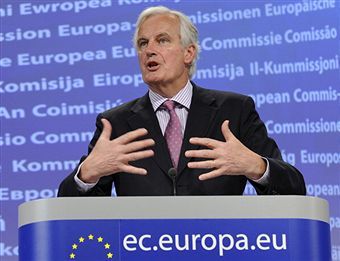 Away from the amateur dramatics in parliament this afternoon, the government is
fighting yet another battle with the European Commission over banking reform. European leaders will vote later today on proposals to introduce the rubric of Basel III across European financial
institutions. Led by EU Finance Commissioner Michel Barnier and ECB Vice-President Jean-Claude Trichet, these proposals would insist that minimal and maximum capital requirements are imposed on
banks. The terms dictate that banks hold 7 per cent of their top-class assets in reserve.
Away from the amateur dramatics in parliament this afternoon, the government is
fighting yet another battle with the European Commission over banking reform. European leaders will vote later today on proposals to introduce the rubric of Basel III across European financial
institutions. Led by EU Finance Commissioner Michel Barnier and ECB Vice-President Jean-Claude Trichet, these proposals would insist that minimal and maximum capital requirements are imposed on
banks. The terms dictate that banks hold 7 per cent of their top-class assets in reserve.
Britain opposes the scheme, not because the requirements are too steep: the UK’s Banking Commission has suggested that banks hold 10 per cent of their assets in reserve. Rather, Britain fears the loss of flexibility in regulation. As one might expect, Barnier’s arguments are couched in the hallowed terms of the Brussels lexicon: there is a need for ‘maximum harmonisation’ and a ‘single rule book’: words that elicit sighs of exasperation in Whitehall. Eroded sovereingty aside, inflexibility may also damage business: McKinsey&Co have warned that Basel III would reduce returns on equity investments by 4 per cent.
Britain has found friends in Germany, Holland, Denmark and Austria in recent months, resisting EU Budget rises, growth in the CAP and so forth. But on this occasion those allies seem to have retreated before the gathering Eurozone crisis. According to the Financial Times, Britain will have to rely on the help of some Eastern European states, Sweden and Spain. It remains to be seen if the other Eurosceptic northern countries can be brought on side, but their loss would be keenly felt in this struggle.
All in all, the episode is a classic example of Europe’s convoluted policy process, which is also on display in the discussions surrounding the economic future of Greece, a proxy for as yet unresolved questions about the euro itself. Acute diplomatic difficulties have led Angela Markel to say that a deal at tomorrow’s euro summit is unlikely. According to Allister Heath, the Bank of England is now ‘extremely worried about the eurozone crisis’ and is likely to delay a hike in interest rates until the crisis passes, which may be like waiting for the conversion of the Jews. Stuck in a morass of its own making, Alan Beattie writes in today’s FT that the EU should pay for its own policy failures and urges Christine Lagarde not to allow the IMF to become Brussels’ lender of last resort.






Comments